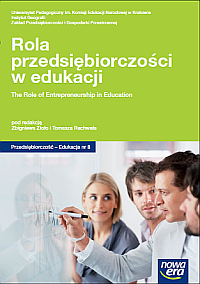Przedsiębiorczość jako postawa wobec innych i świata w kontekście procesu budowania płaszczyzny dla dialogu interpersonalnego. Perspektywa pedagogiczno-kulturowa
DOI:
https://doi.org/10.24917/20833296.8.10Słowa kluczowe:
Przedsiębiorczość, socjologia, kulturaAbstrakt
A need for developing entrepreneurial attitudes in education has been discussed in the literature and pedagogical discourse for a long time already. This issue play a key role in the economy, education, psychology or pedagogy field. There were many expectations when “business studies” subject was introduced into post- secondary schools hoping that this initiative would help to raise economic awareness of young people who are starting their adult life. Many also believed that it would change the market perception and offer opportunities for those who want to get engaged in the market game in order to improve their standard of life. Teachers are those who are mainly responsible for teaching content of the business studies classes and the way they are arranged. The classes are interesting and creative especially that part of it is transferred over to different financial and administration institutions or bank, which is not always approved by schools authorities. On the other hand there is no financial resources to invite experts from outside. However, a part of the educational material is too much focused on psychological determinants of an entrepreneur or they are too general with regards to honesty and ethics issues when making decisions. The author believes that case studies would be more attractive when students could have an opportunity to discuss interesting cases, exchange their views using reasonable arguments. It could be also a good idea to present and discuss biographies of those who became successful, to analyse decisions they made in certain market and economic conditions at the time they were starting their own business undertakings.
The entrepreneurial attitude does not necessarily mean focusing only on maximizing the profits but it can also take into account a fiduciary concept like it is the case in classical theories of social responsibility of business. It is additionally a good starting point for creating dialogue relationships first at the level of educational institutions and later at the level of market dependencies. The author in this paper tries to answer if entrepreneurship can make up a space to establish deeper dialogue relationship. The entrepreneurship is - in the author`s opinion - a good example of building relations between people based on ethical sources. It`s very important for the relationship to concentrate on sincere and in-depth interest in the other man. An authentic meeting of the other man should be ingrained in the truth and genuine experience between two people. It is not only a postulate but also a possibility or a requirement of the present time.
Bibliografia
Antczak S., 2011, Wolny i De Klesz, Jirafa Roja, Warszawa.
Appadurai A., 2005, Nowoczesność bez granic. Kulturowe wymiary globalizacji, przeł. Z. Pucek, Universitas, Kraków.
Buber M., 1992, Ja i Ty. Wybór pism filozoficznych, przeł. J. Doktór, PAX, Warszawa.
Eagleton T., 1985, Capitalism, Modernism and Postmodernism, „New Left Review”, nr 152.
Gielarowski A., 2000, Zasada dialogiczna w wychowaniu, „Edukacja i Religia”, nr 1, http://gielarow.w.interia.pl/zasada.html (dostęp: 23.02.2012).
Kopciuch L., 2011, Zmienność historyczno-kulturowa a poznawanie wartości [w:] Nauka – Poznanie – Globalność, A. Nobis, P. Badyna (red.), Wrocław.
Mader J., 1989, Filozofia dialogu [w:] Filozofia współczesna, J. Tischner (red.), Instytut Teologiczny Księży Misjonarzy, Kraków.
Miller V.J., 2007, Religia w świecie konsumpcji, przeł. T. Szafrański, Verbinum, Warszawa.
Mizera J., 1989, Ontologia fundamentalna Martina Heideggera [w:] Filozofia współczesna, J. Tischner (red.), Instytut Teologiczny Księży Misjonarzy, Kraków.
Młodzi Polacy to lenie?, http://studia.dlastudenta.pl/artykul/Mlodzi_Polacy_to_lenie,73441.html (dostęp: 09.02.2012).
Nobis A., 2006, Zmiana kulturowa: między historią i ewolucją, Arboretum, Wrocław.
Słownik języka polskiego PWN, http://www.pwn.pl/?module=multisearch&search=cwaniactwo&submit2=szukaj (dostęp: 09.02.2012).
Szewczyk K., 1999, Wychować człowieka mądrego. Zarys etyki nauczycielskiej, PWN, Łódź.
Tarnowski J., 1993, Jak wychowywać, ATK, Warszawa.
Wojtyła K., 2000, Osoba i czyn oraz inne studia antropologiczne, KUL, Lublin.
Pobrania
Opublikowane
Jak cytować
Numer
Dział
Licencja
Artykuły publikowane są zgodnie z warunkami licencji Creative Commons (CC BY-ND 4.0; uznanie autorstwa-bez utworów zależnych).

